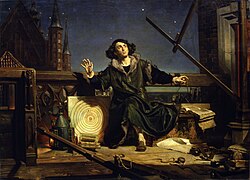
Back Wetenskaplike Rewolusie Afrikaans Anfänge der Wissenschaften ALS ثورة علمية Arabic Revolución científica AST Elmi inqilab Azerbaijani Научна революция Bulgarian বৈজ্ঞানিক বিপ্লব Bengali/Bangla Naučna revolucija BS Revolució científica Catalan شۆڕشی زانستی CKB
 | |
| Date | 1543–1687 |
|---|---|
| Location | Europe |
| Outcome | Copernican Revolution Age of Enlightenment |
The Scientific Revolution was a series of events that marked the emergence of modern science during the early modern period, when developments in mathematics, physics, astronomy, biology (including human anatomy) and chemistry transformed the views of society about nature.[1][2][3][4][5][6] The Scientific Revolution took place in Europe in the second half of the Renaissance period, with the 1543 Nicolaus Copernicus publication De revolutionibus orbium coelestium (On the Revolutions of the Heavenly Spheres) often cited as its beginning.[7] The Scientific Revolution has been called "the most important transformation in human history" since the Neolithic Revolution.[8]
The era of the Scientific Renaissance focused to some degree on recovering the knowledge of the ancients and is considered to have culminated in Isaac Newton's 1687 publication Principia which formulated the laws of motion and universal gravitation,[9] thereby completing the synthesis of a new cosmology. The subsequent Age of Enlightenment saw the concept of a scientific revolution emerge in the 18th-century work of Jean Sylvain Bailly, who described a two-stage process of sweeping away the old and establishing the new.[10] There continues to be scholarly engagement regarding the boundaries of the Scientific Revolution and its chronology.
- ^ Galilei, Galileo (1974) Two New Sciences, trans. Stillman Drake, (Madison: Univ. of Wisconsin Pr. pp. 217, 225, 296–67.
- ^ Moody, Ernest A. (1951). "Galileo and Avempace: The Dynamics of the Leaning Tower Experiment (I)". Journal of the History of Ideas. 12 (2): 163–93. doi:10.2307/2707514. JSTOR 2707514.
- ^ Clagett, Marshall (1961) The Science of Mechanics in the Middle Ages. Madison, Univ. of Wisconsin Pr. pp. 218–19, 252–55, 346, 409–16, 547, 576–78, 673–82
- ^ Maier, Anneliese (1982) "Galileo and the Scholastic Theory of Impetus", pp. 103–23 in On the Threshold of Exact Science: Selected Writings of Anneliese Maier on Late Medieval Natural Philosophy. Philadelphia: Univ. of Pennsylvania Pr. ISBN 0-8122-7831-3
- ^ Hannam, p. 342
- ^ Cite error: The named reference
Grantwas invoked but never defined (see the help page). - ^ Juan Valdez, The Snow Cone Diaries: A Philosopher's Guide to the Information Age, p 367.
- ^ Daston, Lorraine (28 November 2015). "The Invention of Science: A New History of the Scientific Revolution by David Wootton review – a big bang moment". The Guardian. Retrieved 14 November 2024.
- ^ "PHYS 200 – Lecture 3 – Newton's Laws of Motion – Open Yale Courses". oyc.yale.edu. Archived from the original on 30 September 2023. Retrieved 2 August 2015.
- ^ Cohen, I. Bernard (1976). "The Eighteenth-Century Origins of the Concept of Scientific Revolution". Journal of the History of Ideas. 37 (2): 257–88. doi:10.2307/2708824. JSTOR 2708824.